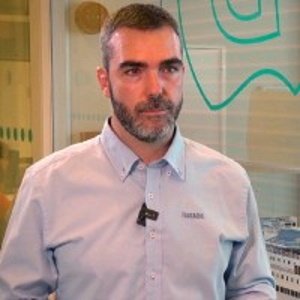Baleària - Experts & Thought Leaders
Latest Baleària news & announcements
Technology group Wärtsilä has signed a ten-year Lifecycle Agreement with Spanish ferry operator Baleària. The agreement covers Baleària’s new high-speed aluminium structure catamaran Ro-Pax ferry, the Margarita Salas, which recently entered service. Margarita Salas The ship was built at the Astilleros Armon Gijon yard in Spain. It operates with four Wärtsilä 31DF dual-fuel engines, four Wärtsilä WXJ hydraulic waterjets, and features two Wärtsilä LNGPac fuel storage and supply systems. A sister-ship, the Eleanor Roosevelt, was delivered earlier with the same Wärtsilä scope. The order for Margarita Salas was booked by Wärtsilä in Q3 2024. Efficiency and sustainability The unique ship design delivered by the Astilleros Armon Gijon yard, combining high-speed waterjets The unique ship design delivered by the Astilleros Armon Gijon yard, combining high-speed waterjets with medium-speed gas-fuelled engines, is proving to be very successful, representing a new Ro-Pax ferry reference case. The Wärtsilä agreement will ensure that the key design values of high efficiency, unmatched customer comfort, reduced operating costs, and environmental sustainability are secured and maintained. Performance and comfort “We feel confident with Wärtsilä solutions which will help us to deliver the high performance and comfort level we offer to our clients while lowering the emissions of our operations,” says Juan Pablo Molina, Corporate Technical Director, Baleària. "The reliability of our service is naturally of key importance to our customers, and this agreement with Wärtsilä provides us the highest expertise from the manufacturer to optimally maintain the vessel at all times." Operating needs and requirements It includes maintenance planning, spare parts and maintenance services for scheduled maintenance The agreement is designed to meet the specific operating needs and requirements of the vessel. It includes maintenance planning, spare parts and maintenance services for scheduled maintenance, operational support, and Wärtsilä’s unique Expert Insight digital predictive maintenance service. “Following the successful delivery of our equipment to the ferry newbuild, we are proud to be supporting Baleària with keeping the vessel reliable operations as efficiently as possible during its lifecycle,” comments Miguel Sanchez, Director of Sales South Europe & Africa - Wärtsilä Marine. Decarbonisation partnership “We have been working with the ferry industry for many years now and have seen an increased number of ferries serviced under long-term agreements, totaling 37 today. This agreement is the fifth we are honoured by Baleària and we look forward to continuing our strong partnership on this decarbonisation journey.” The Margarita Salas operates between Barcelona, the Mallorcan port of Alcudia, and Ciudadela on the island of Menorca.
Representatives of the Spanish maritime and river transport sector met at the Clock Building of the Port of Valencia with the Board of Directors of the Waterborne Technology Platform, at a meeting organised by the Valenciaport Foundation, in collaboration with the Port Authority of Valencia (PAV), with the aim of discussing the next steps in the transition to a zero-emission and at the same time, competitive sector, and to address the benefits that the different European funding mechanisms make available to companies, in order to develop their research and innovation projects. The Waterborne Technology Platform is the European research and innovation platform for the waterborne transport industries, providing policy guidance to European institutions on research, development and innovation, as well as on the deployment of these innovations. Partnership on Zero-Emission Waterborne Transport The debate at this meeting is of particular relevance to the Partnership on Zero-Emission Waterborne Transport The debate at this meeting is of particular relevance to the newly created Partnership on Zero-Emission Waterborne Transport, which offers cooperation between the European Commission and the Waterborne Technology Platform to address innovation projects of strategic interest. The aim of this partnership is to develop and demonstrate zero-emission solutions applicable to all major types of vessels and services by 2030, including ports. The European Commission has earmarked 530 million Euros from Horizon Europe for the Partnership, and the industry has committed to invest more than 3 billion Euros in the period 2021-2030. Meeting featured review of the FuelEU and AFID initiatives The meeting, which was opened by the Director General of the Valenciaport Foundation, Antonio Torregrosa; the President of the Waterborne Technology Platform, Eero Lehtovaara; and the Head of Strategic Planning and Innovation of the APV, Juan Manuel Díez; included two keynote speeches by representatives of the European Commission: Jane Amilhat, Head of Unit of Low Emission Future Industries (aviation, waterborne, steel and coal) – DG for Research and Innovation, who explained how R&D funding programmes contribute to meeting the challenges of the inland waterway transport sector, and Beatriz Yordi, Director of Carbon Markets and Clean Mobility – DG CLIMA, who spoke in depth about the EU Green Deal, and the Fit for 55 package, which includes the review of the FuelEU and AFID initiatives that will regulate decarbonisation in the maritime and inland waterway transport sector. Then, two representatives of the Waterborne Technology Platform: Jaap Gebraad, Secretary General and Maria Boile, Coordinator of the Alignment Goup, presented in depth this initiative and the work being done within the platform, at a table moderated by the Director of Innovation of the Valenciaport Foundation, Salvador Furió. Relevance of Horizon Europe funding mechanisms Relevance of Horizon Europe funding mechanisms for the maritime-port sector was also highlighted During the session, the relevance of Horizon Europe funding mechanisms for the maritime-port sector was also highlighted in a discussion between Julio Dolado, Spanish Representative of the Cluster 5 Programme Committee of Horizon Europe and Project Manager of the EU Programmes Division of the CDTI; Elena Seco, Director General of the Spanish Shipping Association (ANAVE); and Jorge Lara, President of the Ports and Logistics Group of Waterborne and Project Manager of the Valenciaport Foundation. This round table was moderated by the Director of Innovation Promotion of the Valenciaport Foundation, Eva Pérez. Discuss the challenges of decarbonisation of the sector Finally, a round table was held to discuss the challenges of decarbonisation of the sector, the need to innovate in alternative fuels and how R+D+i can help to achieve the objectives of reducing emissions in ports. This session, which has been moderated by Aurelio Lázaro, Project Manager of the Valenciaport Foundation, has counted with the interventions of Cayetano Hoyos, Project Engineer of SOERMAR – Research and Technology Centre of the Private Shipyards; Jesús Blanco, Head of Fleet Projects of Baleària; Daniel del Castillo, Sustainability Director of Navantia, and Juan Manuel Díez, Head of Strategic Planning and Innovation of the PAV. Finally, the attendees enjoyed a guided tour of the Port of Valencia.
The PAV has put into operation several charging points for electric vehicles in the car park for workers and visitors. Specifically, a charger with two outlets has been installed for visitors to the APV facilities, in addition to four chargers with two outlets each for the Valenciaport employees’ car park. Expanding its fleet of vehicles In addition, the PAV has expanded its fleet of vehicles and now has 10 electric cars, a van and two motorbikes, to which four hybrid cars must be added. The aim is to continue increasing these vehicles in line with the strategic objective of Valencia port 2030, zero emissions, which involves all the companies, associations and individuals operating in the port areas of Valencia, Sagunto and Gandia. Valencia port’s collaborations Valencia port is collaborating in initiatives such as the use of cleaner fuels such as Liquefied Natural Gas (LNG) In this sense, Valencia port is collaborating in initiatives such as the use of cleaner fuels such as Liquefied Natural Gas (LNG) in collaboration with the company Baleària; the use of hydrogen in port operations and machinery in the Port of Valencia with the participation of MSC Terminal Valencia or Valencia Terminal Europa of the Grimaldi Group within the framework of the European H2Ports project, which has allowed the installation of a hydrogen plant in the Xità quay. Involvement in projects In addition, the active involvement of companies in sustainable R+D+i projects such as CORE LNG AS HIVE, H2PORTS, GREEN-C-PORTS, ECCLIPSE, EALING and EALINGWorks; or the NO PLÀSTIC campaign coordinated by Aportem-Puerto Solidario, are some examples of the logistics community’s commitment to the fight against climate change. Other projects In this common objective, progress is also being made in the installation of photovoltaic plants with the tender for the project in Gandia shed 4 or in the Príncipe Felipe quay of the Port of Valencia, which will soon be joined by the project in the Valencia Terminal Europa area. Work also continues the wind energy project, the construction of two electrical substations in the Port of Valencia, the changes in the sodium vapour lighting for LEDs in the València and Sagunto precincts, the installation of new environmental control booths, and the railway infrastructures that are being executed to promote intramodality and the connection between the ports and the main corridors.





